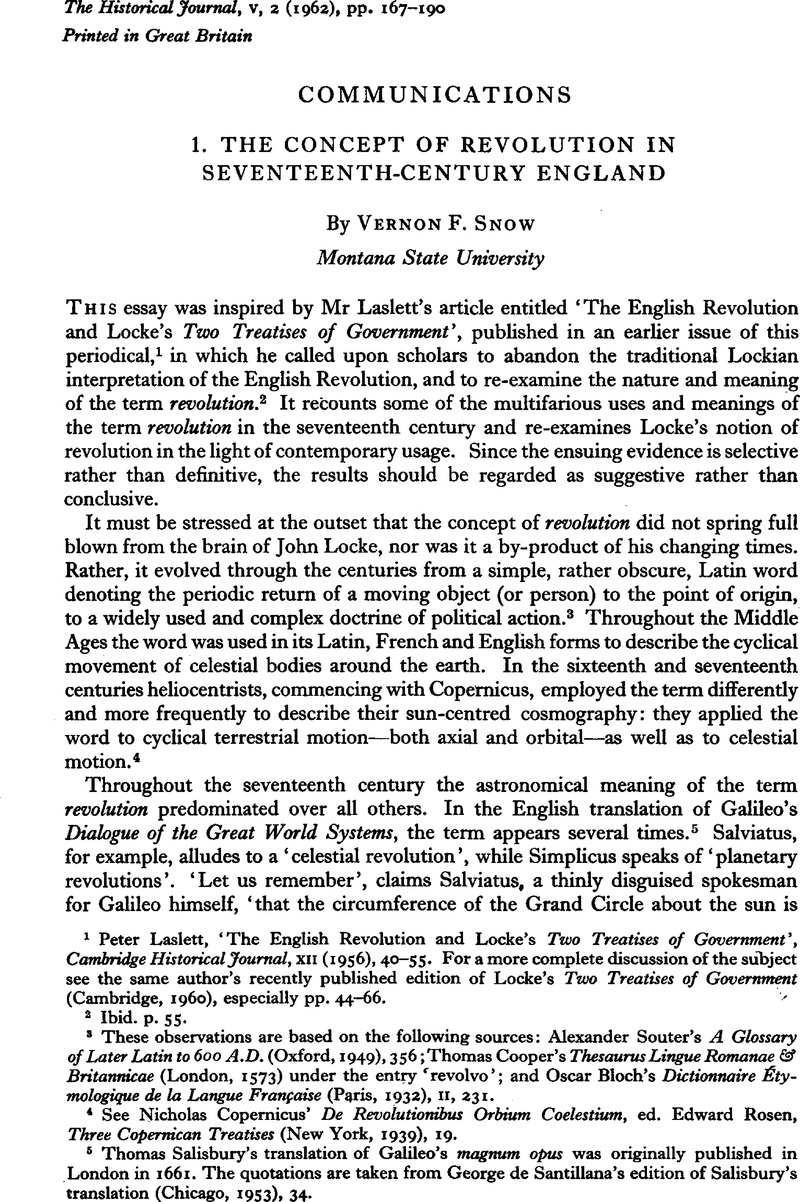Article contents
1. The Concept of Revolution in Seventeenth-Century England
Published online by Cambridge University Press: 11 February 2009
Abstract

- Type
- Communications
- Information
- Copyright
- Copyright © Cambridge University Press 1962
References
1 Laslett, Peter, ‘The English Revolution and Locke's Two Treatises of Government’, Cambridge Historical Journal, xii (1956), 40–55.CrossRefGoogle Scholar For a more complete discussion of the subject see the same author's recently published edition of Locke, 's Two Treatises of Government (Cambridge, 1960), especially pp. 44–66.Google Scholar
2 Ibid. p. 55.
3 These observations are based on the following sources: Souter, Alexander's A Glossary of Later Latin to 600 A.D. (Oxford, 1949), 356Google Scholar; Cooper, Thomas's Thesaurus Lingue Romanas & Britannicae (London, 1573)Google Scholar under the entry ‘revolvo’; and Bloch, Oscar's Dictionnaire Étymologique de la Langue Française (Paris, 1932), II, 231.Google Scholar
4 See Copernicus, Nicholas' De Revolutionibus Orbium Coelestium, ed. Rosen, Edward, Three Copernican Treatises (New York, 1939), 19.Google Scholar
5 Thomas Salisbury's translation of Galileo's magnum opus was originally published in London in 1661. The quotations are taken from George de Santillana's edition of Salisbury's translation (Chicago, 1953), 34.
6 See Florian Cajori's edition published by the University of California Press in 1934.
7 This work was published in London in 1611. See the entry under ‘revolution’.
8 See Kersey, John's Dictoriarum Anglo-Britannicum or a General Dictionary (London, 1715)Google Scholar; Philip, Edward's The New World of Words (London, 1720)Google Scholar; and Johnson, 's English Dictionary (London, 1755).Google Scholar
9 See Chaucer, 's Complaint of MarsGoogle Scholar and his Treatise on the Astrolabe in Walter Skeat, W.'s edition, The Complete Works of Geoffrey Chaucer (Oxford, 1894).Google Scholar
10 Shakespeare, William, Hamlet, v. I. 98.Google Scholar
11 Wilson, Arthur, The History of Great Britain (London, 1653).Google Scholar
12 See his Historical Discourses (London, 1705), preface.
13 Hobbes, Thomas, Elements of Philosophy, Molesworth edn. (London, 1839–1845), I, 317–28.Google Scholar
14 Waller, A. R.'s edition of The Essayes of Michael Ford of Montaigne (London, 1910), I, 149.Google Scholar
15 Remaines (London, 1637), 199.Google Scholar
16 Wilson, , op. cit.Google Scholar
17 Howell, James, Familiar Letters (London, 1892), IIGoogle Scholar, under the date 20 January 1646.
18 Giraffi's book entitled Le rivolutioni di Napoli…con pienissimo ragguaglio d'ogni successo, e trattati secreti e palesi was first published in Venice in 1647 and again in 1648. Subsequent editions appeared in Genoa (1648), London (1650–52 and 1664), Ferrara (1687), and Parma (1718). The following contemporary accounts should also be mentioned: Reiva, Placido's Delle rivolutioni delle cittá di Palermo avvente l'anno 1647 (Verona, 1648)Google Scholar, and de Mormoiron, Raimond's Histoire des revolutions de la ville et du royaume de Naples (Paris, 1667, 1668, 1826).Google Scholar For two relatively recent accounts of this revolt see Merriman, Roger Bigelow, Six Contemporaneous Revolutions (Oxford, 1938), 17–27, 98 and 27–35Google Scholar, and Koenigsberger, H. G., ‘The Revolt of Palermo in 1647’, Cambridge Historical Journal, viii, 129–44.Google Scholar
19 His treatise entitled A Seasonable Discourse, wherein is Examined what is Lawful during the Confusion and Revolutions of Government, especially in the Case of a King deserting his Kingdom was published in 1648, 1649 and again in 1689. For a discussion of Ascham see Zagorin, Perez, A History of Political Thought in the English Revolution (London, 1954), 64–7.Google Scholar
20 For a discussion of this work, entitled An exact historie of the late revolution in Naples; and of their monstrous success, see Joseph Jacob's edition of Howell, James's Familiar Letters (London, 1892), II, 638.Google Scholar
21 This appears in Gutch, John's Collectanea Curiosa (Oxford, 1781), I, 228–53.Google Scholar
22 For the best discussion of Wren see Wren, Stephen's Parentalia: Or Memoirs of the Family of the Wrens (London, 1750), 55 ff.Google Scholar
23 For a good discussion of the mechanistic influence on Harrington see Zagorin, Perez, History of Political Ideas in the English Revolution (London, 1952), 133–6.Google Scholar
24 From Harrington, 's Prerogative of Popular GovernmentGoogle Scholar in the 1771 edition of his Works (London), 244–5.
25 See Temple, 's Essay upon the Origin and Nature of GovernmentGoogle Scholar in Jonathan Swift's edition of his Works (London, 1720), I, 107. Like Wren, Temple alluded to the ‘fatal Revolution of the Crown and Nation between 1641 and 1660’ in his Essay on Popular Discontents (p. 261).
26 John, J. A. St's edition of The Philosophical Works of John Locke (London, 1894), ii, 476–88.Google Scholar
27 Locke, John, Some Thoughts Concerning Education, ed. Quick, R. H. (Cambridge, 1902), 158.Google Scholar
28 Peter Laslett demonstrates that Wren, 's treatise entitled Monarchy Asserted (Oxford, 1659)Google Scholar was in Locke's library; in fact, he possessed two copies. Of the aforementioned authors Locke also possessed the works of Galileo, Hobbes, Harrington, Bernier and Montaigne (see Appendix B of Laslett's edition of Locke's Two Treatises, 130–45).
29 See Lough, John, Locke's Travels in France, 1675–79 (Cambridge, 1953), xx, 150 n., 177, 282Google Scholar, and Bonno, Gabriel's Les Relations Intellectuelles de Locke avec La France (Berkeley, 1955).Google Scholar The best account of Bernier and his work is Vincent A. Smith, 's edition of Travels in the Mogul Empire (Oxford, 1916), especially the introduction.Google Scholar
30 Laslett, , Locke's Two Treatises, 432.Google Scholar
31 Ibid. 433.
- 17
- Cited by


